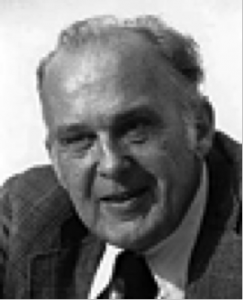This is part of a series remembering and honoring evaluation pioneers leading up to Memorial Day in the USA on May 30.
My name is Mel Mark, a former AEA President and former editor of the American Journal of Evaluation. Don Campbell used pithy phrases to communicate complex philosophical or methodological issues. My favorite was: “Cousin to the amoeba, how can we know for certain?” This encapsulates his philosophy of science which informed his contributions to evaluation.
Pioneering and enduring contributions:
Campbell’s pioneering contributions included work on bias in social perception, intergroup stereotyping, visual illusion, measurement, research design and validity, and evaluation, which was at the center of his vision of “an experimenting society.” He believed in the evolution of knowledge through learning: “In science we are like sailors who must repair a rotting ship while it is afloat at sea. We depend on the relative soundness of all other planks while we replace a particularly weak one. Each of the planks we now depend on we will in turn have to replace. No one of them is a foundation, nor point of certainty, no one of them is incorrigible.”

Campbell’s work reminds us that every approach to evaluation is founded in epistemological assumptions and that being explicit about those assumptions, and their implications, is part of our responsibility as evaluators. Campbell wanted science, and evaluation, to keep the goal of truth, testing and inferring what is real in the world. But he acknowledged this goal as unattainable so “we accept a . . . surrogate goal of increasing coherence even if we regard this as merely our best available approximation of the truth.”
Campbell was an intellectual giant but disarmingly modest. He was gracious and helpful to students and colleagues, and equally gracious to his critics. His openness to criticism and self-criticism modeled his vision of a “mutually monitoring, disputatious community of scholars.” Those who knew Don Campbell know with all the certainty allowed to humans just how special he was.
Reference for quotations:
Mark, M. M.(1998). The Philosophy of science (and of life) of Donald T. Campbell,
American Journal of Evaluation, 19, 3: 399-402.
Resources:
Bickman, L., Cook, T. D., Mark, M.M., Reichardt, C.S., Sechest, L., Shadish, W.R., & Trochim, W.M.K. (1998). Tributes to Donald T. Campbell. American Journal of Evaluation, 19(3): 397-426.
Brewer, M.B. & Collins, B.E. (Eds.) (1981) Scientific inquiry and the social sciences: a volume in honor of Donald T. Campbell. Jossey-Bass.
Campbell, D.T. (1994). Retrospective and prospective on program impact assessment. American Journal of Evaluation, 15 (3): 291-298.
Campbell, D.T. & Russo, J. (2001). Social measurement. Sage.
The American Evaluation Association is celebrating Memorial Week in Evaluation: Remembering and Honoring Evaluation’s Pioneers. The contributions this week are remembrances of evaluation pioneers who made enduring contributions to our field. Do you have questions, concerns, kudos, or content to extend this aea365 contribution? Please add them in the comments section for this post on the aea365 webpage so that we may enrich our community of practice. Would you like to submit an aea365 Tip? Please send a note of interest to aea365@eval.org . aea365 is sponsored by the American Evaluation Association and provides a Tip-a-Day by and for evaluators.

Pingback: Rethinking Evaluation Competencies in 2021: Questions to Focus Our Efforts - Evaluating Complexity